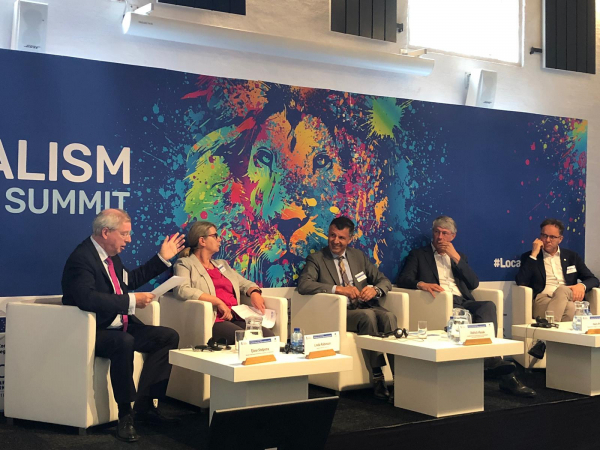Local leaders call for reshaping the EU at an annual Localism Summit in the Netherlands

The European Union needs to re-shape its politics to ensure that local and regional governments have a greater role in designing and improving policies, leading politicians from the European Conservatives and Reformists (ECR) group said at the second Localism Summit, on 7 June.
Priority issues for cooperation between all levels of government should be policies to boost sustainability, to bridge the urban-rural divide and to promote the latest smart-city developments, said MEPs, national politicians, and members of the European Committee of the Regions (CoR). Representatives of the European Commission and think-tanks also spoke at the Summit, which was held in Beetsterzwaag in the Netherlands.
The Summit, which was organised by the ECR group in the CoR, is the second of what is becoming an annual event intended to raise the profile of localism across Europe. The first edition of the Summit took place in September last year in Milan, the capital of the Italian Lombardy region.
Alderman Rob Jonkman, President of the ECR Group in the CoR, said: "The main motivation behind our Summit is the need to identify areas where the voice of local and regional government needs to be strengthened at the EU level."
Mr Jonkman, a member of the Executive Council of Opsterland in the Netherlands, continued: "More than two-thirds of EU legislation impacts local and regional authorities. However, very often the views of local and regional politicians are not sufficiently taken into account in the policy design. To achieve a better-functioning and less centralised EU, we need to work in cooperation within our shared institutions, but equally importantly we need to push Brussels into a new direction so that it listens more to the voice of its regions and local communities."
ECR Group Vice-President Oldřich Vlasák, a member of the City Council of Hradec Králové in the Czech Republic, said that the EU should use localism as the main tool to incentivise sustainability and environmentalism. "Local and regional authorities play a key role in implementing EU regulations in areas such as water management. What we see, however, is that despite their important role in policy implementation, they are not sufficiently involved in policy design at EU level. Changing this would help the EU to become more cautious when it comes to establishing unrealistic targets and burdensome bureaucratic requirements."
According to Roberto Ciambetti, head of Veneto Regional Council in Italy, another area where a more bottom-up approach is needed at the EU level is the Common Agricultural Policy. "We need to shift away from the old paradigm of centrally-managed agricultural subsidies towards a system where regions play a more prominent role. An improved and more decentralised system of public investments would benefit the environment, farmers and consumers alike. It would also help Europe to bridge its growing urban-rural divide".
The exchange of views in Beetsterzwaag will be used to develop the ECR's localism agenda in key areas that bring tangible benefits to citizens.
A keynote speaker was Nicolaas Beets, the Dutch Special Envoy for the Urban Agenda. The Agenda emerged in 2016 thanks to the Netherlands, which used its presidency of the Council of the European Union to develop a pan-European agenda intended to improve the quality of urban life. Mr Beets told the Summit that the Urban Agenda has created momentum for bottom-up institutional changes in Europe. "The Urban Agenda has brought cities of all sizes at one table with the European Commission, Member States and stakeholders to discuss a smarter, greener and more inclusive EU". However, he noted, "the introduction of multilevel governance to the EU [now] deserves [a proper] a follow-up."
In the future mandate of the European Parliament and European Commission, the ECR Group will continue to work with policymakers to ensure that localism not only remains on the EU agenda but also comes to shape future policies to the extent that it becomes a principle to the EU as a whole.

